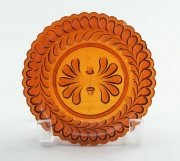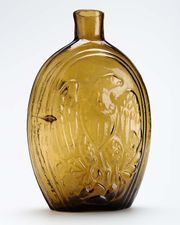Difference between revisions of "Amber glass"
Jump to navigation
Jump to search
| (2 intermediate revisions by the same user not shown) | |||
| Line 1: | Line 1: | ||
| − | [[File:1979.699-SC41890.jpg|thumb|]] | + | [[File:1979.699-SC41890.jpg|thumb|Sandwich glass<br>MFA # 1979.699]] |
== Description == | == Description == | ||
A pale yellow glass tinted with mixtures of [[sulfur|sulfur]] and [[iron%20oxide%20red|red iron oxide]]. Red and orange colors were the easiest to make and occurred naturally in early glassware. From the 16th century, the inexpensive amber-color glassware was commonly used for medicine bottles and chemicals in order to prevent deterioration from light. In the US, the New England Glass Company, patented a formula to produce a yellowish amber color glassware. Its successor, the Libbey Glass Company, made a wide range of ornamental colored tableware ranging from golden to reddish. By the early 20th century, amber color glasses became popular in 'Depression era' glassware. | A pale yellow glass tinted with mixtures of [[sulfur|sulfur]] and [[iron%20oxide%20red|red iron oxide]]. Red and orange colors were the easiest to make and occurred naturally in early glassware. From the 16th century, the inexpensive amber-color glassware was commonly used for medicine bottles and chemicals in order to prevent deterioration from light. In the US, the New England Glass Company, patented a formula to produce a yellowish amber color glassware. Its successor, the Libbey Glass Company, made a wide range of ornamental colored tableware ranging from golden to reddish. By the early 20th century, amber color glasses became popular in 'Depression era' glassware. | ||
| − | + | [[File:Amberjar 1987733.jpg|thumb|American Flask<br>MFA# 1987.733]] | |
== Synonyms and Related Terms == | == Synonyms and Related Terms == | ||
| Line 12: | Line 12: | ||
* G.S.Brady, ''Materials Handbook'', McGraw-Hill Book Co., New York, 1971 Comment: p.365 | * G.S.Brady, ''Materials Handbook'', McGraw-Hill Book Co., New York, 1971 Comment: p.365 | ||
| − | * Encyclopedia Britannica: https://www.britannica.com/art/amberina-glass. | + | * Encyclopedia Britannica: [https://www.britannica.com/art/amberina-glass link] Accessed August 2020 |
| + | |||
| + | * History of Amber glass jars: [http://blog.waresofknutsford.co.uk/amber-glass-jars-a-history/ link] Accessed August 2020 | ||
[[Category:Materials database]] | [[Category:Materials database]] | ||
Latest revision as of 15:12, 23 August 2020
Description
A pale yellow glass tinted with mixtures of Sulfur and red iron oxide. Red and orange colors were the easiest to make and occurred naturally in early glassware. From the 16th century, the inexpensive amber-color glassware was commonly used for medicine bottles and chemicals in order to prevent deterioration from light. In the US, the New England Glass Company, patented a formula to produce a yellowish amber color glassware. Its successor, the Libbey Glass Company, made a wide range of ornamental colored tableware ranging from golden to reddish. By the early 20th century, amber color glasses became popular in 'Depression era' glassware.
Synonyms and Related Terms
amberina; rose amber; vidrio ámbar (Esp.); vidro âmbar (Port.)
Resources and Citations
- G.S.Brady, Materials Handbook, McGraw-Hill Book Co., New York, 1971 Comment: p.365
- Encyclopedia Britannica: link Accessed August 2020
- History of Amber glass jars: link Accessed August 2020

